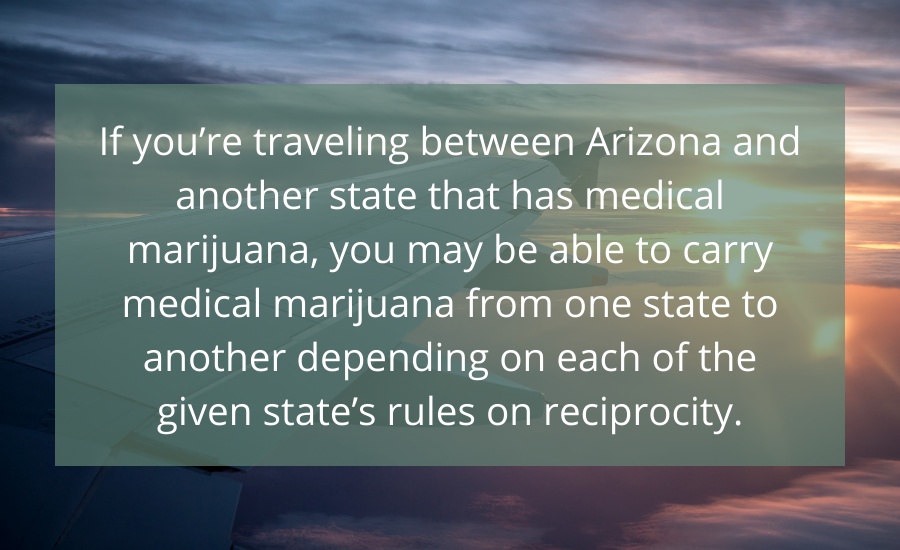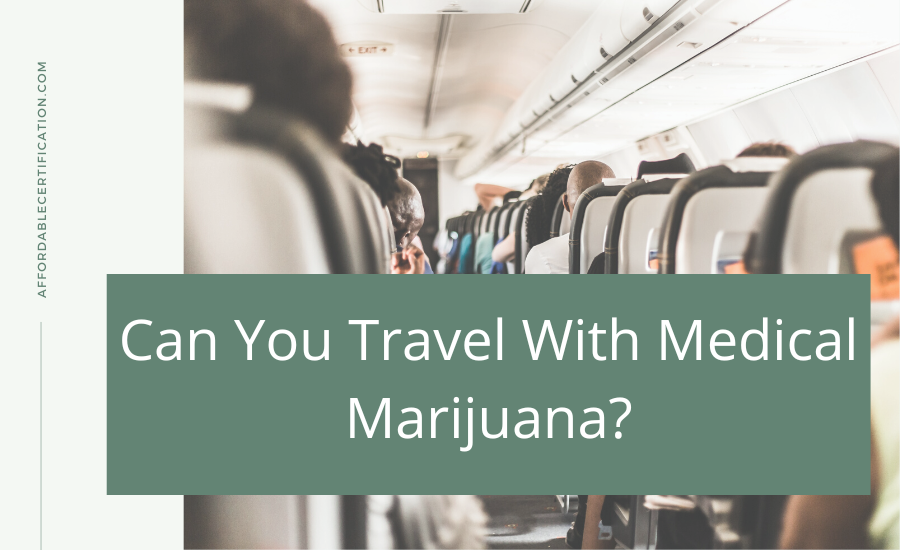Short answer: Medical marijuana laws vary between states, and federal marijuana laws differ from state medical marijuana laws. It is therefore vital to be aware of the risks you take when traveling with medical marijuana or purchasing medical marijuana in another state and how to mitigate those risks.
Can You Travel With Medical Marijuana?
Whether you travel for professional or personal reasons, if you have a medical marijuana card, you may be uncertain about how to make sure you have the medical marijuana you need while you’re away from home. Do you bring it with you? Do you buy it there? Are you legally allowed to do either? This article aims to answer those questions, so you can have safe access and a safe trip.
State vs. Federal Medical Marijuana Laws
Certain states in which marijuana is still illegal, even for medical use, have specifically outlawed exporting or importing marijuana over their borders. While, even with both states having legalized medical marijuana, crossing the border between them is still illegal federally.
Patient protections in different states and, sometimes, different counties within a state, vary. But, medical marijuana patients, even in their home state like Arizona where medical marijuana is legal, are still in violation of federal law when possessing marijuana, as it’s still considered a Schedule I controlled substance federally.
Borders between states are federal jurisdiction, which means crossing borders with substances illegal on a federal level subjects you to federal prosecution for drug trafficking, even if the substance in question (ie. medical marijuana) is legal in both states.
Read also: Official 2022 Arizona Laws and Rules for Medical Marijuana Cards.
Federal Penalties for Drug Trafficking
Despite its illegality on a federal level, the chances of being arrested by federal law enforcement for possession of marijuana are low. Still, the penalties if it does happen are severe. If you’re charged with trafficking marijuana, you could face, at minimum, a fine of up to $250,000 and up to five years in prison for a first offense and twice that for a second one.
Typically, only distributors of high volumes of marijuana receive such penalties, but that doesn’t mean a person with a much smaller amount isn’t still in violation of those same laws and, therefore, at risk of receiving the same penalties.
Can I Fly With Medical Marijuana?
Federal law trumps state law in airports, but airport security has bigger priorities than marijuana.
Federal Property
Even medical marijuana is illegal federally; this includes most marijuana-infused products, including CBD oil products. Airports are federal property, even those in states with medical marijuana. This means it’s against federal law to carry most marijuana products, medical or otherwise, onto an airplane–be it in your carry-on or checked luggage.
Exceptions
It is now legal federally to carry CBD products containing no greater than 0.3 percent THC according to the product’s dry weight; it is also now federally legal to carry any cannabis-infused product approved by the FDA (such as certain synthetic cannabis products available only by prescription.) This means you can bring these products onto a plane with you, either in your carry-on bag or checked luggage.
TSA
The Transportation Security Administration, TSA, is responsible for airport security. TSA officers must report to federal, state or local authorities any activity they believe to be in violation of law.
However, as stated on the TSA medical marijuana webpage, screening procedures have been designed to protect passengers and aviation from potential security threats; they do not count marijuana as such a threat. Therefore, TSA officers are not actively searching for marijuana when they search you and your bags prior to entering the boarding area. That said, if they find marijuana in the process of their search, they are required to report it to law enforcement.
The takeaway from this is that, if you plan to travel on a plane with medical marijuana, secure it well, don’t act suspiciously and be aware of the risk you’re taking.
Air Traveling With Weed Medical Card
Because airports and borders are under federal jurisdiction, TSA officers are federal, not state, employees and marijuana is illegal federally, medical marijuana cards are not valid in airports. That applies even in states where medical marijuana is legal, even if it’s the same state that issued the card in question.
Therefore, showing a TSA agent your medical marijuana card before they search your bags and person might only make them suspicious about what you’re carrying and showing the agent your card after they’ve found marijuana on your person or in your carry-on will likely have little bearing on the consequences.

Can I Travel With My Medical Weed By Ground?
If you’re traveling between Arizona and another state that has medical marijuana, you may be able to carry medical marijuana from one state to another depending on each of the given state’s rules on reciprocity. (More on that in a moment.)
Borders Are Still Borders
As mentioned earlier, borders are under federal jurisdiction. That means, even if you’re traveling in a car between two states with mutual reciprocity, you’re still breaking federal law by crossing the border.
Reciprocity
In terms of medical marijuana, reciprocity is an agreement a state makes to recognize the medical marijuana cards issued by other states. Reciprocity laws provide non-resident medical marijuana patients some degree of legal protection. These laws apply however you arrive in another state outside your home state.
Like the rest of the medical marijuana laws in a given state, however, reciprocity laws differ. In some states, non-resident patients only receive certain basic protections; in other states, non-resident patients are granted the same rights as resident ones. For example, under a given state’s medical marijuana laws, you may or may not be allowed to purchase medical marijuana at an out-of-state medical marijuana dispensary; you may, as discussed in greater detail in the next section below, need to purchase your medical marijuana from a retail dispensary in the state to which you’re traveling instead.
It is, therefore, essential you understand, as a traveling medical marijuana patient, where and how to access marijuana legally when traveling.
Reciprocity in Arizona
Arizona has marijuana reciprocity laws on the books. That means the state of Arizona, including state and local law enforcement authorities, recognizes and honors the medical marijuana cards issued from other medical marijuana states. However, like most states with reciprocity, patients visiting Arizona with a medical marijuana card are subject to the rules and restrictions of Arizona medical marijuana law, not the medical marijuana laws of their home state where the card was issued. That means, if the laws in each state disagree, Arizona’s law will win out. (By the same token, Arizona medical marijuana cardholders traveling to another state with reciprocity are subject to the medical marijuana laws of that state, not Arizona’s.)
In addition to a current and valid medical marijuana card issued by their home state, medical marijuana patients visiting Arizona should be ready to show a current and valid photo ID issued by the state (such as a driver’s license) or the federal government (such as a U.S. passport) if requested to do so.
Reciprocity is particularly valuable for patients traveling outside their home state to obtain specialized medical treatments and those who must be in the care of family or friends who live out of state.
Like resident medical marijuana patients, visiting patients to Arizona are allowed to possess up to 2.5 ounces of usable marijuana at any one time. However, unlike resident patients, visiting ones are not allowed to purchase marijuana at an Arizona medical marijuana dispensary.
Read also: What Allotment Medical Marijuana Patients Have in Arizona.
Safe Access Outside Your Home State
Instead of traveling with medical marijuana across state borders–whether by plane, train or automobile–you could try to purchase your medical marijuana in the state to which you’ll be traveling.
If the medical marijuana laws in a particular state prohibit non-resident patients from purchasing medical marijuana at an in-state medical marijuana dispensary, you may have to purchase your marijuana from an adult-use dispensary. This, of course, is only possible if the state to which you’re traveling has legalized adult-use (aka recreational) marijuana.
Be aware that, because medical marijuana laws are state rather than federal laws, labeling requirements and product safety testing differ between states. Moreover, a state with both medical and adult-use marijuana legalized may have different labeling and product safety testing requirements for medical and adult-use marijuana.
Note as well that many states that do permit non-resident patients to purchase marijuana there–whether at a medical or adult-use dispensary–still prohibit those patients from bringing that marijuana with them out of state.
Read also: Qualifying Conditions for Getting a Medical Marijuana Card in Arizona.
Getting Your Arizona Medical Marijuana Card
Our Affordable Certification service provides online consultations with certified doctors to help patients get an Arizona medical marijuana card quickly and easily without leaving their homes. Create an account with us at affordablecertification.com to schedule a telemedicine call with an Arizona licensed doctor.

